Call for Abstracts: CLARIN Annual Conference 2019
30 September - 2 October, Leipzig, Germany
CLARIN
is happy to announce the CLARIN Annual Conference 2019 and calls for the submission of extended abstracts. We especially invite papers for a thematic session that reports on research carried out in the Humanities or the Social Sciences that crucially made use of language resources, technology or services from the CLARIN infrastructure.
The CLARIN Annual Conference is organized for the wider Humanities and Social Sciences community in order to exchange experiences with and plans for the CLARIN infrastructure. This includes the design, construction and operation of the CLARIN infrastructure, the data, tools and services that it contains or should contain, its actual use by researchers, its relation to other infrastructures, and projects and the CLARIN Knowledge Sharing Infrastructure.
Submission deadline: 15 April 2019
Read the full Call for Abstracts
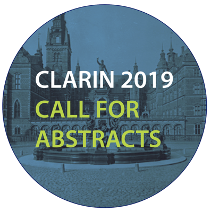
Four centres officially recognized as CLARIN Knowledge Centres
CLARIN ERIC is pleased to announce that the following four centres have been officially recognized as CLARIN Knowledge centres (K-centres):
- IMPACT centre of competence - CLARIN K-centre in digitisation (IMPACT-CKC)
IMPACT-CKC offers its expertise and resources in digitisation and related fields to all institutions and particulars looking for advice. Read more about IMPACT-CKC - CLARIN K-Centre for Terminology Resources and Translation Corpora (TRTC)
CLARIN-TRTC aims at providing a helpdesk, information and events addressing terminology resources (termbases, glossaries, ontologies, etc.) and translation corpora (text, multimodal). Read more about CLARIN-TRTC - CLARIN Knowledge Centre for Swedish in a Multilingual Setting (SMS)
CLARIN-SMS offers expertise in linguistic processing of text, especially for Swedish and/or when multiple languages are involved. In addition, CLARIN-SMS offers expertise in the application of language technology to Swedish Sign Language. Read more about CLARIN-SMS - CLARIN-DiaRes – CLARIN K-centre for Diachronic Language resources
CLARIN-DiaRes is focused around diachronic text collections, and as a special case of these, historical texts, as well as tools and resources for processing and analyzing these. Read more about CLARIN-DiaRes
CLARIN ERIC congratulates all the centres and thanks all persons involved in particular those responsible at the new centres!
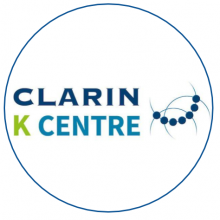
Becoming a CLARIN Knowledge Centre
Everyone involved in CLARIN, whatever their role is, needs knowledge and expertise to do their jobs. One of the building bricks of the CLARIN Knowledge Sharing Infrastructureare knowledge centres (K-centres). Their role is to provide a place (physical or virtual) where people (both researchers or educators using the infrastructure, and those who help building or operating it) can get cross-border access to knowledge and expertise in specific areas.
Have you considered to have your centre recognized as a CLARIN K-Centre, either on your own or together with other partners (possibly in other countries)? You can do so with not too much effort, and you can do so even if you are not active in CLARIN yet, and even if you are not in a CLARIN member country.
For more information, have a look at the page on knowledge centres, in particular the instructions for applicants. It is also possible for an institution to join an existing distributed K-Centre as one more partner if you have expertise in the same area.
Tour de CLARIN Visits Latvia!
The next stop on our Tour de CLARIN is the coordinating centre of CLARIN Latvia, the Artificial Intelligence Laboratory at the University of Latvia, which has been conducting research on natural language processing and has provided access to different language resources, including corpora and lexicons, for almost 30 years.
Read more
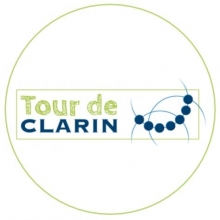
Re-assessment of IMS and MPI for Psycholinguistics successfully concluded
We are pleased to announce that the Institut für Maschinelle Sprachverarbeitung (IMS)in Stuttgart and the MPI for Psycholinguisticsin Nijmegen have been assessed again according to the current criteria and are both certified as a CLARIN B-centre.
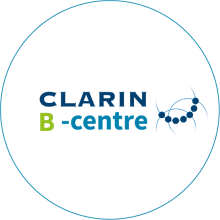
CLARIN-D working group for non-German philology
CLARIN-D supports research in languages other than German by providing services for exploring non-German language data, analyzing written and spoken texts, and archiving corpora and research results. The Working Group 2 ‘Other Philologies’ is a network of scholars of foreign languages within CLARIN-D whose aim is to support foreign philologies through digital research infrastructures.
More information about the Working Group "Other Philologies"
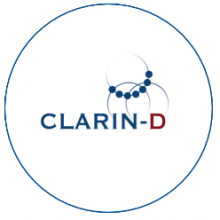
BLOG
Hacking the GDPR to Conduct Research with Language Resources in Digital Humanities and Social Sciences
In the midst of a winter landscape, at Vilnius, Lithuania, the workshop Hacking the GDPR to Conduct Research with Language Resources in Digital Humanities and Social Sciences took place on 7 December 2018.
The workshop, organised by the CLARIN Legal and Ethical Issues Committee (CLIC), hosted by CLARIN-LT, and supported by CLARIN ERIC, aimed to explore the changes brought to research in the Digital Humanities and Social Sciences disciplines by the introduction of the EU General Data Protection Regulation (GDPR) and, most specifically, the way its application affects the construction, distribution and exploitation of Language Resources (LRs). Read more
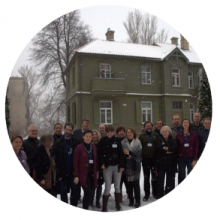
WATCH THIS!
Interview with James Pustejovsky
Conducted during the CLARIN Annual Conference 2018 in Pisa
In this interview, James Pustejovsky (professor of Computer Science at Brandeis University, USA), talks about the abundance of digital archival information and academic research, explains why computers should be seen as ‘collaborators’ and not just ‘tools’, and gives his opinion on the work of CLARIN.
Watch the interview here
Video recordings from the 7th CLARIN Annual Conference in Pisa are now published on the Videolectures platform
The CLARIN annual conference in 2018 was organized by CLARIN ERICin collaboration with the Institute for Computational Linguistics (ILC) that is part of the Department of Social Science and Humanities, Cultural Heritage (DSU) of the National Research Council of Italy (CNR). The conference took place in Pisa, Italy from Monday 8 October, to Wednesday 10 October, 2018.
Watch the videos here
EVENTS & CALLS
ACDH virtual hackathon series
The Austrian Centre for Digital Humanities of the Austrian Academy of Sciences (ACDH-OeAW) is launching a virtual Open Data hackathon series, offering people all over the globe the possibility to participate and contribute without having to travel. Three hackathons will be held and will centre on three data sets that are connected to Open Data events taking place in spring 2019. The core goal of this event series is to promote openness in the digital humanities, and show a path towards putting it into practice.
Read more about the hackathon series
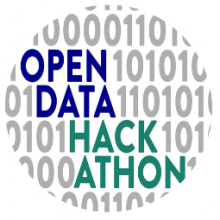
Call for participation: Workshop “Twin Talks: Understanding Collaboration in DH”
5 March 2019, Copenhagen, Denmark (during DHN2019)
You are invited to participate in the full day workshop “Twin Talks: Understanding Collaboration in DH” that will take place on 5 March 2019 during DHN2019in Copenhagen, Denmark.
The workshop aim is to get a better understanding of the dynamics on the Digital Humanities work floor where humanities scholars and digital experts meet and work in tandem to solve humanities research questions.
The workshop programme and information about the registration can be found here
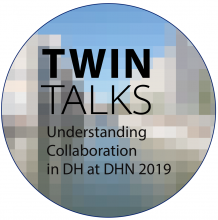
XV AISV Conference: Audio archives at the crossroads of Speech Sciences, Digital Humanities and Digital Heritage
14-16 February 2019, Arezzo, Italy
From 14 February till 16 February the The XV AISV conference Audio archives at the crossroads of Speech Sciences, Digital Humanities and Digital Heritage takes place at the Department of Education, human sciences and intercultural communication in Arezzo, Italy.
Keynote talk and CLARIN Tutorial
The XV AISV conference aims at discussing possibilities for a closer collaboration between speech scientists, speech technologists and oral historians. Because it involves people from both Speech Sciences and Oral History, it is the ideal setting for the CLARIN tutorial entitled“Creating, Managing and Analysing Speech Databases using BAS Services and Emu” byFlorian Schiel and Christopher Draxler and the keynote talk on"Spoken Word Archives as Societal and Cultural Data" byFranciska de Jong.
See the complete programme
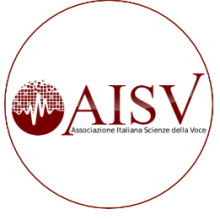
EURISE Workshop: Software Sustainability within Research Infrastructures
12-13 March 2019, Utrecht ,The Netherlands
The infrastructures CESSDA, CLARINand DARIAHunder the umbrella of the EURISE Network, the European Research Infrastructure Software Engineers’ Network, invite you to participate in their joint workshop on Digital Infrastructure Sustainability.
Some of the topics for discussion are: developer guidelines and best practices; software quality measures and assessment; infrastructure service management; infrastructure security; business models and sustainability; what role do research infrastructures play in research software engineering, and more.
Read more about the EURISE Workshop
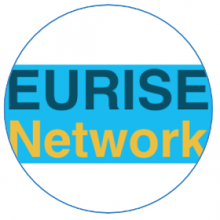
NLP-adapt: Adaptive Workflow Management for NLP Data Processing
5 - 9 May 2019, Venice, Italy
Professionals and their teams are invited to contribute to NLP-adapt: Adaptive Workflow Management for NLP Data Processing- a special track of IARA's ADAPTIVE 2019: The Eleventh International Conference on Adaptive and Self-Adaptive Systems and Applications.
Read the full call for papers
Call for Papers - DARIAH Annual Event 2019: Humanities Data
15-17 May 2019, Warsaw, Poland
The Call for Papers for DARIAH Annual Event 2019is open. This year the event has the theme of examining the notion of ‘data’ in the Humanities, and the research questions that arise from this.
The deadline for submissions is 15 March 2019.
Read the full call for papers
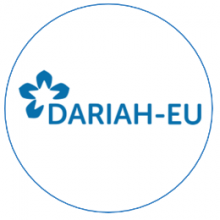
Lancaster Summer Schools in Corpus Linguistics
24-27 June 2019, Lancaster, UK
The summer school in Corpus linguistics for analysis of language, discourse and society is aimed at students and researchers from different disciplines (e.g. linguistics, sociology, political science, social anthropology, education, economics, gender studies, history etc) who are interested in analysing language data using quantitative (corpus) methods.
The course is offered by our CLARIN UK partners at Lancaster University.
Registration is free and is open now.
More information and registration
Corpus Linguistics Summer School 2019
24-28 June 2019, Birmingham, UK
Registration is now open the 4th Corpus Linguistics Summer School, offered by our CLARIN UK partners, will take place at the University of Birmingham. The summer school aims to equip participants with critical expertise in both theory and practice of corpus-based linguistic research.
Attendance is open to all on a first come, first served basis, upon payment of the registration fee through the university's online shop. Places are limited and tend to sell out quickly, so potential delegates are advised to book early.
Registration fee: £150 student, £190 non-student
More information and registration
Call for Papers - ELEX 2019: SMART LEXICOGRAPHY
1–3 October 2019, Sintra, Portugal
The Call for paper for ELEX2019is open. The conference aims to explore innovative developments in the field of electronic lexicography. The focus of this conference is on smart lexicography.
The deadline for abstract submission is 15 February 2019.
Read the full call for papers
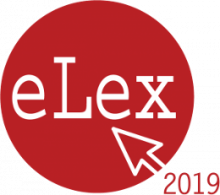
JOB OPENINGS
Postdoctoral Researcher in Lexicography and Natural Language Processing
Data Science Institute, NUI Galway
Applications are invited from suitably qualified candidates for a full-time, fixed term position as a Postdoctoral Researcher with the Data Science Institute at the National University of Ireland, Galway. This position is funded by European Union's Horizon 2020 research and innovation programme under grant agreement No 731015 and is available from 1st April 2019 to contract end date of 1st April 2021.
Closing date for receipt of applications is 5.00 pm (Irish Time), Thursday 28th February 2019.
Further information about the vacancy can be found on the NUI Galway Research Jobs (vacancy number NUIG-004-19)
Open positions at the Austrian Centre for Digital Humanities (ACDH)
The Austrian Centre for Digital Humanities, a research department of the Austrian Academy of Sciences (Austria’s leading non-university research facility), has open positions for:
- Web Developer for new large-scale research infrastructure project
- Digital Lexicographer
- Postdoc in Digital Prosopography
- Postdoc in Machine Learning